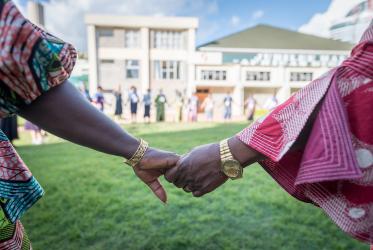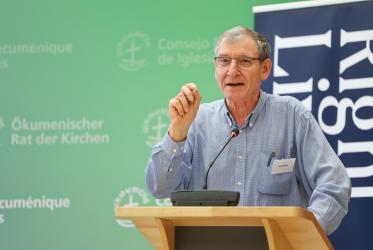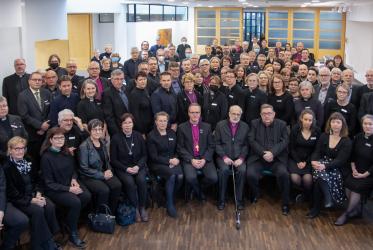In 2018 we celebrate the 70th anniversary of the World Council of Churches. In order to create a lively firsthand account of the ecumenical fellowship and of our shared journey, member churches have contributed stories of people, events, achievements and even failures, all of which have deepened our collective search for Christian unity.
This story was provided by Bishop Heinz Joachim Held (ret.), moderator of WCC’s Central Committee from 1983 to 1991.
Any views or opinions expressed in this article are those of the authors, and do not necessarily reflect the policies of the World Council of Churches.
The date: 20 February 1991. It was the last day of the 7th Assembly of the World Council of Churches (WCC) in Canberra. The hours before the concluding prayers were packed full of the remaining agenda items. It was hard to imagine how we would make it!
As moderator, it fell to me, along with the general secretary and my two vice-moderators, to guide this huge assembly of almost 900 delegates, with many delegated representatives, official guests and advisers. One thing was clear: we wouldn’t get through everything.
The start of the second Gulf War in mid-January gave the assembly an unforeseen topic that moved hearts and minds much more than the official guiding theme of “Come, Holy Spirit – Renew the Whole Creation.” The shocking outbreak of war in the Middle East proved the topical nature of our theological conference theme, which in this world political crisis was put in our mouths like a cry for help.
It kept us busy, albeit in two very different ways: via an in-depth, intelligent speech delivered by the Orthodox Patriarch Parthenios from Alexandria, who told us of the wealth of the Holy Spirit’s teaching, and through the presentation by Korean theology professor Chung Hyung Kyung, who approached the subject directly in the context of the political, ecological and social challenges of the present, introduced by an impressive folklore dance performance.
It was hard to imagine a sharper contrast: on the one hand, solid, proven theology with intellectual clarity and pastoral forcefulness, and on the other hand, a moving mix of thinking, designation of problems, calls to prayer and directions, an unfamiliar type of theological address, even crowned by a theatrical performance.
It was therefore not surprising that the assembly now had a second unofficial theme, for which we were ultimately not prepared and which we did not manage to cover more than the first topic, the clarification of our attitude towards the use of military force in defence and in overcoming obvious human rights violations. Added to this was the controversy on the admissibility of theological thinking along unusual lines, in dimensions other than those of the old church tradition.
In both cases, differences or even opposites that had always been a part of the WCC community suddenly appeared anew. We saw tensions that had the potential of calling this community into question and breaking it up, unless we learned to be “wise as serpents and innocent as doves” with each other. In any case, rushing things through would not have got us very far, especially on the last day of an assembly.
Consequently, we were surely well advised when we moved to postpone decisions on all of this, to give ourselves time to stop and think things through. Besides, how could such fundamental issues of conscience and truth possibly be decided by mere majority decision?
Even at the last sitting on this last day, the Orthodox Churches submitted a memorandum detailing their long-standing unease regarding procedures and theological developments within the WCC. There was only time to accept it and set it aside for further consideration in the very near future.
No, we didn’t finish and were unable to do so. Although we stood at the end of an assembly, we had come up against limits, basic questions, which touched on substance. Would we ever be able to finish them off once and for all? Or rather, shouldn’t we be able to learn to live with them? Perhaps we had even reached the limits of our ecumenical possibilities! Would the churches’ unity ultimately be something different from a uniform theological and socio-ethical definition, a single ecclesiastical order and life culture?
What is unity? Not the unity that suits us and appeals to us, but rather the unity which God wants and which we should seek?
As moderator, how was I supposed to bring this incomplete, basically unfinished assembly to a close? Of course, we had taken many decisions, adopted various declarations, approved a message and adopted the programme guidelines for the near future.
We had held the necessary elections and adopted the reports on the thematic discussions – by the skin of our teeth, as always: relieved, but with some uneasiness. Now the time had run out; we had already gone over by 75 minutes. And above all our common strength had run out.
I had been given clear instructions as to the opening of the assembly, which I gratefully accepted. They left it up to me to decide for the closing. I scarcely had time to think about it, up to and including that last day.
I don’t really know it came about, but I suddenly realized how it should end. After a word of thanks to the general secretary, I decided against making personal closing remarks. I read the Beatitudes and Jesus’ Sermon on the Mount from the Gospel of Matthew, simply because this biblical text has come to mean more and more to me over the years.
Then we said the Lord’s Prayer, each in their own language, because Christ himself gave it to us. We ended with a Spanish-language hymn that I grew to appreciate during my decade of ministry in Latin America: “Santo, santo, santo, mi corazón te adora, mi corazón te sabe decir: Santo eres, Señor“ – Holy, holy, holy. My heart, my heart adores you! My heart is glad to say, the words: You are holy, Lord!
Then I felt I had said everything that needed to be said at the end of a very eventful assembly. Today, more than 25 years later, I see it like a legacy, what it was already intended to be then, as my wish, my hope, my intercession for the WCC and its future development.
Are not the Beatitudes the quintessence of the Christian faith, all theology and all practical Christianity, of faith and order, and life and work together, a promise and instructions in one? Only a praying person can manage to help “that they all be one”, as in Jesus’ last request. And the heart can bow to God and devote itself to him.







